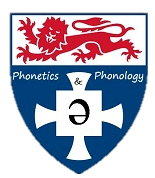-
News:
Accent Articulation Conference First Language Acquisition gamification Group focuses Job Laboratory Phonology Lecturer Linguistics Morphology Perception PhD Funding Phonetics Phonetics and Phonology Phonology Professor Project on Tyneside English Psycholinguistics R Research associate science open day Sociolinguistics Sociophonetics Speech Signal Analysis Speech signal processing statistics Workshop
Author Archives: Fengting
Stefano Coretta’s Workshop on Electroglottography (EGG)
Date: 06/27/2021 Stefano Coretta from the University of Edinburgh has a wide range of knowledge in statistical analyses and research methods in linguistics research. Today we had him walk us through how to operate the EGG machine, apply it in … Continue reading
Posted in Uncategorised
Leave a comment
Three-minute thesis final
Date: 16th June, 16:00 – 18:00 Location: Baddiley Clark Seminar RoomBook: https://workshops.ncl.ac.uk/view/book/modal/50275/ Drinks reception and canapés from 16:00 Presentations will begin at 17:00 The finals of the 3-minute thesis are taking place on the 16th of June. One of our members, Carol-Ann McConnellogue, has … Continue reading
Posted in Conferences, Uncategorised
Tagged Conference, Sociolinguistics, Sociophonetics
Leave a comment
Melissa Baese-Berk’s Talk
Date: 06/12/2021 Prof. Melissa and her colleagues and students are constantly productive in the research of speech processing as well as accent perception and adaptation. In her talk, she walked us through their new work on the adaptation to unfamiliar … Continue reading
Job: Lecturer/Senior Lecturer
For current researchers in this area at the university you can see the Phonetics & Phonology research groups people page.Posted date: 06-Dec-2021Closing date: 10-Jan-2022 More Information Full job description can be found at here. The Role The School of Education, Communication and … Continue reading
Job: Research Assistant (Laboratory Manager)
For current researchers in this area at the university you can see the Phonetics & Phonology research groups people page.Posted date: 23-Nov-2021Closing date: 7-Dec-2021 More Information Full job description can be found at here. The Role The School of Education, Communication and … Continue reading

